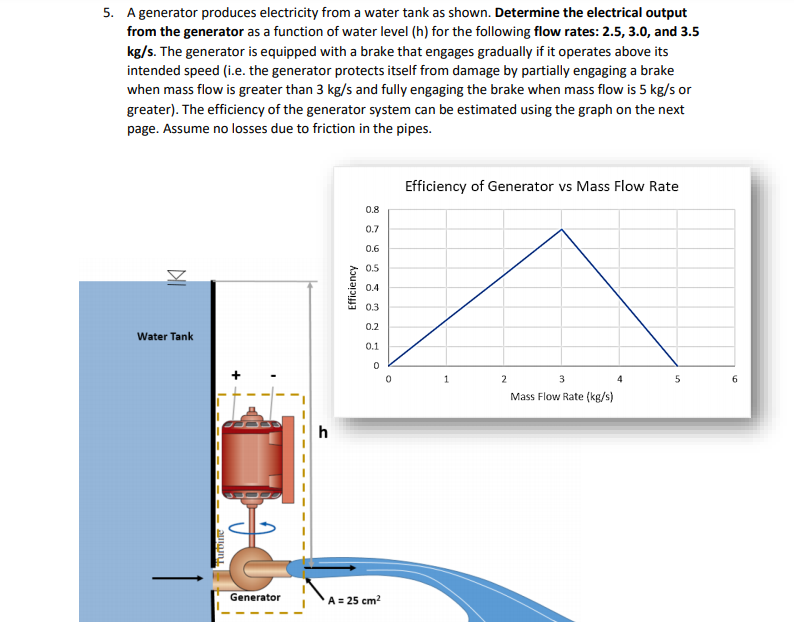5. A generator produces electricity from a water tank as shown. Determine the electrical output from the generator as a function of water level (h) for the following flow rates: 2.5, 3.0, and 3.5 kg/s. The generator is equipped with a brake that engages gradually if it operates above its intended speed (i.e. the generator protects itself from damage by partially engaging a brake when mass flow is greater than 3 kg/s and fully engaging the brake when mass flow is 5 kg/s or greater). The efficiency of the generator system can be estimated using the graph on the next page. Assume no losses due to friction in the pipes. Efficiency of Generator vs Mass Flow Rate 0.8 0.7 0.6 0.5 0.4 0.3 0.2 Water Tank 0.1 1. 2 6. Mass Flow Rate (kg/s) Generator A= 25 cm? Efficiency
5. A generator produces electricity from a water tank as shown. Determine the electrical output from the generator as a function of water level (h) for the following flow rates: 2.5, 3.0, and 3.5 kg/s. The generator is equipped with a brake that engages gradually if it operates above its intended speed (i.e. the generator protects itself from damage by partially engaging a brake when mass flow is greater than 3 kg/s and fully engaging the brake when mass flow is 5 kg/s or greater). The efficiency of the generator system can be estimated using the graph on the next page. Assume no losses due to friction in the pipes. Efficiency of Generator vs Mass Flow Rate 0.8 0.7 0.6 0.5 0.4 0.3 0.2 Water Tank 0.1 1. 2 6. Mass Flow Rate (kg/s) Generator A= 25 cm? Efficiency
Elements Of Electromagnetics
7th Edition
ISBN:9780190698614
Author:Sadiku, Matthew N. O.
Publisher:Sadiku, Matthew N. O.
ChapterMA: Math Assessment
Section: Chapter Questions
Problem 1.1MA
Related questions
Question
I get a little confused when it is stated "Flow rate is = Ma" Isnt flow rate= Av?

Transcribed Image Text:5. A generator produces electricity from a water tank as shown. Determine the electrical output
from the generator as a function of water level (h) for the following flow rates: 2.5, 3.0, and 3.5
kg/s. The generator is equipped with a brake that engages gradually if it operates above its
intended speed (i.e. the generator protects itself from damage by partially engaging a brake
when mass flow is greater than 3 kg/s and fully engaging the brake when mass flow is 5 kg/s or
greater). The efficiency of the generator system can be estimated using the graph on the next
page. Assume no losses due to friction in the pipes.
Efficiency of Generator vs Mass Flow Rate
0.8
0.7
0.6
0.5
0.4
0.3
0.2
Water Tank
0.1
2
4
6.
Mass Flow Rate (kg/s)
h
Generator
A = 25 cm?
Efficiency
Expert Solution
This question has been solved!
Explore an expertly crafted, step-by-step solution for a thorough understanding of key concepts.
This is a popular solution!
Trending now
This is a popular solution!
Step by step
Solved in 4 steps with 4 images

Knowledge Booster
Learn more about
Need a deep-dive on the concept behind this application? Look no further. Learn more about this topic, mechanical-engineering and related others by exploring similar questions and additional content below.Recommended textbooks for you

Elements Of Electromagnetics
Mechanical Engineering
ISBN:
9780190698614
Author:
Sadiku, Matthew N. O.
Publisher:
Oxford University Press

Mechanics of Materials (10th Edition)
Mechanical Engineering
ISBN:
9780134319650
Author:
Russell C. Hibbeler
Publisher:
PEARSON

Thermodynamics: An Engineering Approach
Mechanical Engineering
ISBN:
9781259822674
Author:
Yunus A. Cengel Dr., Michael A. Boles
Publisher:
McGraw-Hill Education

Elements Of Electromagnetics
Mechanical Engineering
ISBN:
9780190698614
Author:
Sadiku, Matthew N. O.
Publisher:
Oxford University Press

Mechanics of Materials (10th Edition)
Mechanical Engineering
ISBN:
9780134319650
Author:
Russell C. Hibbeler
Publisher:
PEARSON

Thermodynamics: An Engineering Approach
Mechanical Engineering
ISBN:
9781259822674
Author:
Yunus A. Cengel Dr., Michael A. Boles
Publisher:
McGraw-Hill Education

Control Systems Engineering
Mechanical Engineering
ISBN:
9781118170519
Author:
Norman S. Nise
Publisher:
WILEY

Mechanics of Materials (MindTap Course List)
Mechanical Engineering
ISBN:
9781337093347
Author:
Barry J. Goodno, James M. Gere
Publisher:
Cengage Learning

Engineering Mechanics: Statics
Mechanical Engineering
ISBN:
9781118807330
Author:
James L. Meriam, L. G. Kraige, J. N. Bolton
Publisher:
WILEY